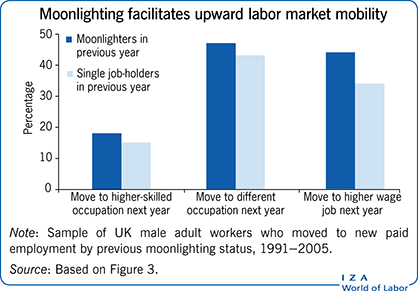Elevator pitch
Multiple job-holding, or “moonlighting,” is an important form of atypical employment in most economies. New forms of work, driven by digitalization, may enable its future growth. However, many misconceptions exist, including the belief that multiple job-holders are low-skilled workers who moonlight primarily for financial reasons, or that the practice increases during economic downturns. Recent literature highlights the significant links between moonlighting and job mobility. Multiple job-holding allows for the development of workers’ skills and spurs entrepreneurship.

Key findings
Pros
Higher net income and financial security can be secured by holding multiple jobs, especially when the primary job is constrained by hours or earnings.
Task variety associated with a second job can motivate and increase work satisfaction.
A second job can increase development of new job skills.
Multiple job-holding has positive effects on future job mobility and career prospects.
Holding multiple jobs may foster increased entrepreneurship and can lead to a new job that better matches a worker's skills.
Cons
A healthy work–life balance is harder to maintain when holding multiple jobs, and a greater rate of absenteeism may occur.
Conflicts of interest may arise between multiple jobs; misappropriation of public resources can occur if the primary job is in the public sector.
Conflict of social insurance entitlements may occur when moonlighters are not, or only partially covered by different employers.
Multiple job-holding is associated with a greater risk of both workplace and non-work injuries.
Moonlighting can increase participation in the informal economy and lead to tax evasion.